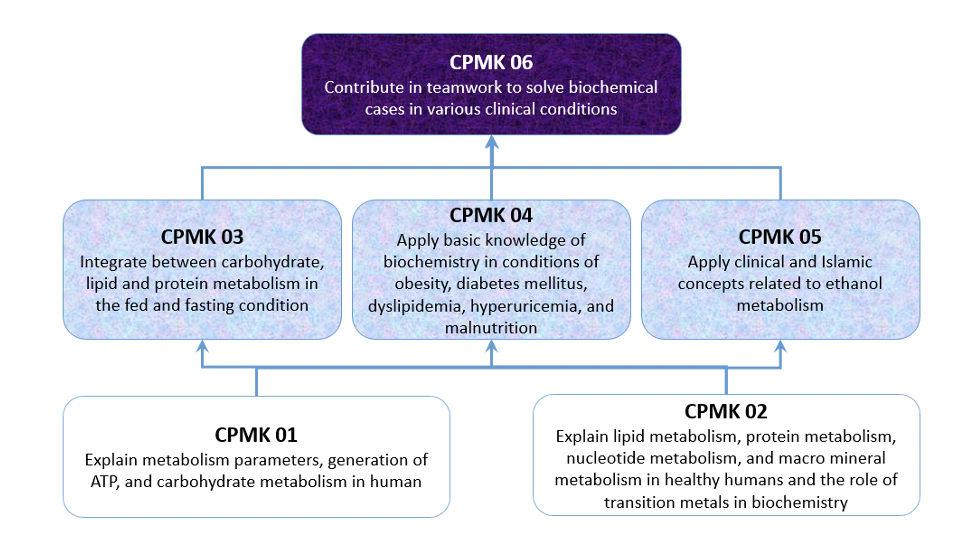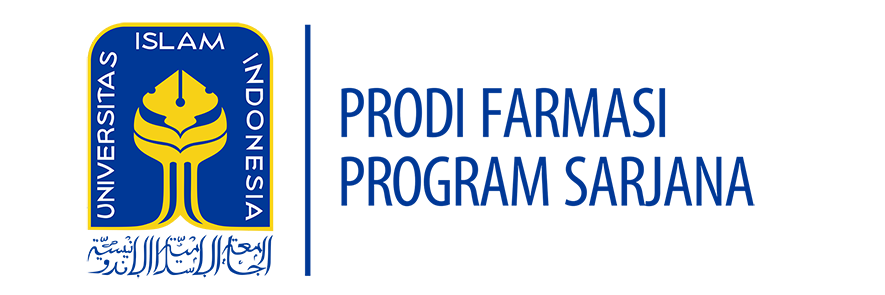1. Course Identification
| Course | Biochemistry | |||
| Faculty | Mathematics and Natural Sciences | Study Program | Pharmacy | |
| Code | SFA-215 | Credits | 3 credits | |
| Group | Study Program | Status | Compulsory | |
| Semester | II (Second) | Availability | Limited in Study Program | |
| Learning Method | Class | Media | Web-enhanced Learning | |
| Cluster | Biomedical and Pharmaceutical Sciences: Pharmaceutical Chemistry | Prerequisite | Organic Chemistry | |
2. Course Description
Biochemistry courses in the Curriculum in Pharmacy Study Program are given to second-semester students with a weight of 3 credits. This subject is a compulsory subject that is taken with Organic Chemistry as prerequisites. This course aims to support the Learning Outcomes in the form of mastery of basic biomedical sciences, integrative thinking skills, and cooperative skills. In this course, students will study the chemical processes of living cells, especially in humans. In this lecture, basic biochemical knowledge will be given, including the concepts of metabolism and metabolic parameters, generation of ATP, carbohydrate metabolism, lipid metabolism, protein metabolism, integration metabolism in the fed and fasting condition, mineral metabolism, nucleotide metabolism, and ethanol metabolism. Also, the application of knowledge about Biochemistry in solving relevant clinical cases will be studied in this course. This activity will train students’ abilities in critical thinking, working together, expressing opinions, and presenting.
1. Learning Outcome
| LO Code | LO |
| PEF2 | Able to comprehend the fundamental theories, methods, concepts and application of biomedical sciences supporting the development of pharmaceutical sciences and services. |
| PEF6 | Able to comprehend the basic principles of integrating Islamic values within pharmaceutical sciences and practices. |
| KUF6 | Able to analyze collaboration and partnership opportunities for self- and career development as well as be able to positively contribute in any teamwork. |
2. Course Learning Outcome and indicators
| Supported LO Code | CLO Code | CLO and indicators |
| PEF2 | CLO1 | Explain metabolism parameters, generation of ATP, and carbohydrate metabolism in human
1. Students can explain systematically metabolism parameters, generation of ATP, and carbohydrate metabolism in human |
| CLO2 | Explain lipid metabolism, protein metabolism, nucleotide metabolism, and macro mineral metabolism in healthy humans and the role of transition metals in biochemistry
1. Students can explain correctly lipid metabolism, protein metabolism, nucleotide metabolism, and macromineral metabolism in healthy humans and the role of transition metals in biochemistry |
|
| CLO3 | Integrate between carbohydrate, lipid and protein metabolism in the fed and fasting condition
1. Students can integrate comprehensively between carbohydrate, lipid and protein metabolism in the fed and fasting condition |
|
| CLO4 | Apply basic knowledge of biochemistry in conditions of obesity, diabetes mellitus, dyslipidemia, hyperuricemia, and malnutrition
1. Students can apply correctly and appropriately basic knowledge of biochemistry in various clinical conditions, including obesity, diabetes mellitus, dyslipidemia, hyperuricemia, and malnutrition |
|
| PEF6 | CLO5 | Apply clinical and Islamic concepts related to ethanol metabolism
1. Students can correctly apply clinical and Islamic concepts related to ethanol metabolism |
| KUF6 | CLO6 | Contribute in teamwork to solve biochemical cases in various clinical conditions
1. Students can contribute actively in teamwork to solve biochemical cases in various clinical conditions |
3. Course Learning Outcome Map Analysis

Primary References
- Rodwell V. W., Bender D. A., Botham K. M., Kennelly P. J., Weil P. A., 2018, Harper’s Biochemistry 31st Edition, McGraw-Hill Companies, New York
- Lieberman M and Peet A, 2018, Marks’ Basic Medical Biochemistry: A Clinical Approach 5th Edition, Wolters Kluwer, Philadelphia
- Ferrier D. R., 2014, Lippincott’s Illustrated Reviews: Biochemistry 6th Ed., Lippincott Williams and Wilkins
Other
Most of the cases are downloaded from National Center for Case Study Teaching in Science (https://sciencecases.lib.buffalo.edu/)
1. Learning activities
| Sesion | CLO | Topic | Learning activities |
| 1 | CLO1 | Learning contracts
Introduction of Biochemistry for Pharmacist Basic of Metabolism |
Class:
Lecturer consents the learning contracts with the students. Class will be performed using Mentimeter, Google Form and case study to study the topics Topics: · Learning contracts (20 min): Framework of course, Learning Outcome, Topics-Sub Topics, References, Learning Strategies, and Grading System. · Introduction of Biochemistry for Pharmacist (60 min): Mentimeter & Case Study · Basic of Metabolism (60 min): Google Form & discussion Online · Google Form to identify student’s background and basic metabolism · Mentimeter to identify student’s prior knowledge about biochemistry for pharmacist and their expectation · Flipped classroom: Enzyme part 1 Saturday 29/02/2020, 09.40-12.10 |
| 2 | CLO1 | Enzyme | Class
Enzyme: · Structure, classification & nomenclature · Enzyme specificity · Role of cofactor in enzymatic reaction · Enzyme kinetics part 1 Online: Mini quiz about enzyme part 1 Flipped classroom: Enzyme part 2 Saturday 07/03/2020, 09.40-12.10 |
| 3 | CLO1 | Enzyme kinetics | Class
Enzyme: Enzyme kinetics part 2 Enzyme in clinical & pharmacy practice Online Mini quiz about enzyme part 2 Flipped classroom: Generation of ATP (Oxidative phosphorylation and aerobic glycolisis) Saturday 14/03/2020, 09.40-12.10 |
| 4 | CLO1 | Generation of ATP | Class
Generation of ATP: · Oxidative phosphorylation · Generation of ATP from carbohydrate: Aerobic Glycolisis Online Mini quiz about ATP part 1 Saturday 21/03/2020, 09.40-12.10 |
| 5 | CLO1 | Anaerobic glycolysis and glycolisis in erithrocyte | Online Class
Topics: Anaerobic glycolysis and glycolisis in erithrocyte Online quiz with Google Form Flipped classroom: Generation of ATP (Pyruvic decarboxylation and Creb’s cycle) Saturday 28/03/2020, 09.40-12.10 |
| 6 | CLO1 | Generation of ATP from carbohydrate: oxidation of pyruvate and Creb’s cycle
Carbohydrate metabolism |
Class
Generation of ATP from carbohydrate: oxidation of pyruvate and Creb’s cycle Carbohydrate metabolism: glycogen metabolism & phosphate pentose pathway Online Mini quiz about ATP 2 Saturday 04/04/2020, 09.40-12.10 |
| 7 | CLO5 | Ethanol metabolism | Online Class
Group and Individual Assignment: Ethanol metabolism from Islam and clinical perspective · Groups upload the assignment in Google Classroom (max 5 minutes) · Each students (individual assignment) do peer-review for each group. Fill Google Form of each group (80 minutes) for suggestions, questions, and assessments. Responses of Google Form will be accessible for all students. · Group members answer or respon to any suggestions and questions from other students (60 minutes) by filling Google Form Saturday 11/04/2020, 09.40-12.10 |
| 8 | CLO1
CLO5 |
Mid-term examination | |
| 9 | CLO2 | Generation of ATP from lipid | Class
Generation of ATP from lipid: structure and characteristics of fatty acid oxidation beta-oxydation of fatty acid Online Mini quiz about ATP 3 Flipped classroom: Lipid metabolism (synthesis of fatty acids) Saturday 02/05/2020, 09.40-12.10 |
| 10 | CLO2 | Lipid metabolism | Class
Lipid metabolism: synthesis of fatty acids and lipoproteins Online Mini quiz about Lipid metabolism Flipped classroom: Protein metabolism (urea cycle, synthesis and degradation of amino acids) Saturday 09/05/2020, 09.40-12.10 |
| 11 | CLO2 | Protein metabolism | Class
Protein metabolism: basic concept of protein metabolism, urea cycle, synthesis and degradation of amino acids Online Mini quiz about protein metabolism Flipped classroom: Gluconeogenesis and blood glucose control Saturday 06/06/2020, 09.40-12.10 |
| 12 | CLO2
CLO3 |
Gluconeogenesis and blood glucose control | Class
Gluconeogenesis and blood glucose control Integration Metabolism in the fed and fasting condition Online Mini quiz about gluconeogenesis and blood glucose control Saturday 13/06/2020, 09.40-12.10 |
| 13 | CLO2
CLO6 |
Mineral Metabolism | Online Class
Group and Individual Assignment: Mineral Metabolism · Groups upload the assignment in Google Classroom (max 5 minutes) · Each students (individual assignment) do peer-review for each group. Fill Google Form of each group (80 minutes) for suggestions, questions, and assessments. Responses of Google Form will be accessible for all students. · Group members answer or respon to any suggestions and questions from other students (60 minutes) by filling Google Form Flipped classroom: Nucleotide metabolism Saturday 20/06/2020, 09.40-12.10 |
| 14 | CLO2
CLO6 |
Nucleotide metabolism and its clinical disorders | Class
Nucleotide metabolism and its clinical disorders Online Group assignment about application of biochemistry in clinical condition Saturday 27/06/2020, 09.40-12.10 |
| 15 | CLO4
CLO6 |
Biochemistry in clinical condition | Class
Biochemistry in clinical condition: Obesity, Malnutrition, Diabetes Mellitus, Dyslipidemia and Hyperuricemia Case study Presentation Online Exam preparation tests Saturday 04/07/2020, 09.40-12.10 |
| 16 | CLO2
CLO3 CLO4 |
Final examination |
2. Learning Experience
The learning process use flipped classroom method. Meanwhile, topics in biochemistry will be learned based on case studies, quizzes and assignments that are held online and offline
1. Assessment
| CLO Code | Assessment | Weight |
| CLO1 | Assignment
Quiz Examination |
25% |
| CLO2 | Assignment
Quiz Examination |
25% |
| CLO3 | Assignment
Quiz Examination |
10% |
| CLO4 | Assignment
Quiz Examination |
15% |
| CLO5 | Assignment
Quiz Examination |
15% |
| CLO6 | Assignment | 10% |
2. Grading and Evaluation Systems
Grading system uses reference assessment as follows:
| Letter Value | Weight | Minimum Value | Value Range |
| A | 4 | 80 | 80.00 – 100 |
| A- | 3.75 | 77.5 | 77.50 – 79.99 |
| A/B | 3.5 | 75 | 75.00 – 77.49 |
| B+ | 3.25 | 72.5 | 72.50 – 74.99 |
| B | 3 | 70 | 70.00 – 72.49 |
| B- | 2.75 | 67.5 | 67.50 – 69.99 |
| B/C | 2.5 | 65 | 65.00 – 67.49 |
| C+ | 2.25 | 62.5 | 62.50 – 64.99 |
| C | 2 | 60 | 60.00 – 62.49 |
| C- | 1.75 | 55 | 55.00 – 59.99 |
| C/D | 1.5 | 50 | 50.00 – 54.99 |
| D+ | 1.25 | 45 | 45.00 – 49.99 |
| D | 1 | 40 | 40.00 – 44.99 |
| E | 0 | 0 | < 40 |
Evaluation Systems
Students must achieve a grade of at least 40 for each course learning outcome. If it does not meet the requirements, they must carry out the test/remedial for the relevant course learning outcome.
